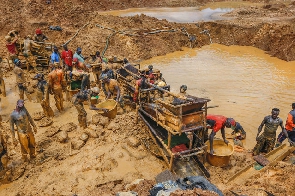Galamsey remains a very hot and a test case for Ghana's commitment in the protection against the pillage of the environment. Throughout the history of Ghana, there has never been anything that has caused so much devastation to Ghana's environment than galamsey.
And when we talk about the environment, we mean the water bodies, the soil, trees, etc. Human existence or extinction depends on the health of the environment. A healthy environment remains absolutely important for human existence while an unhealthy environment could obliterate human existence.
As a molecular ecologist and plant pathologist, I want to highlight the unseen, yet crucial things that are being destroyed by our reckless endangerment of the environment. Most of us are bemoaning galamsey because we see the destruction of visible things like the trees, water bodies, and others. I will try to be as less technical as possible in this piece.
Only recently, a renown pathologist, Prof Sampene, opined that due to galamsey, babies are being born with cringing deformities. His preliminary investigations, according to him, reveal that, the placentas of mothers have been clogged with mercury, led, and other heavy metals that are used in galamsey. As a result, embryos and babies in their mothers' wombs ingest these metals or toxins through the placentas of their mothers which is then accounting for the strange onset of the deformities we are seeing.
While the destruction of these visible things in addition to what I just narrated must be concerning, it should be more concerning to us the destruction of unseen beneficial organisms in our ecosystem - mostly in the nature of microbiome. In the ecosystem, mesofaunas and microorganisms are very essential for the health of the environment. Many scientists have used the presence and abundance of these organisms as indicators for soil and environmental health.
Key amongst their roles is the provision of functional ecosystem services. Without these ecosystem services, higher animals like humans cannot exist, especially if you consider that humans have no ability to manufacture their own food. We depend on plants and other organisms to survive. Without plants, humans cannot survive.
Plants depend on many millions of microorganisms to also survive. The relationship between plants and microorganisms could be mostly described as symbiotic relationship. Some microorganisms protect plants against other organisms that are pathogenic (disease-causing organisms). Some organisms mobilise essential nutrients such as phosphorus, irons, etc for plants. In the case of phosphorus for instance, it is mostly bound in unavailable forms until it's broken down for plant uptake. Without phosphorus, no plant can live - as it constitutes an integral part of plant DNA, amongst other uses.
God in his wisdom has created some microorganisms whose job is to breakdown certain nutrients like phosphorus and to make them available for plants uptake. Some organisms, as I mentioned, protect the plants against pathogens. All these microbes, are so essential that, their absence will lead to plant epidemics and deaths.
With our stubborn pillage of the environment, we are likely to loose all these essential microorganisms. Recently, my Institute, Hans Ruthenberg Institute of the University of Hohenheim, Germany has been investigating the potential use of fungi to remediate contaminated soils - with Ghana being the focal point due to galamsey. As I look at what's going on, I ask myself, even if we want to restore the destroyed soils and lands, how are we going to do it when we don't even have data on how much biodiversity we have lost or are loosing.
To make things clear to readers, I am saying that what's going threatens our food security since very soon plants cannot have access to essential nutrients for their growth which will lead to low or no yields due to the absence of beneficial microorganisms. Also, we are likely to see the upsurge of plant epidemics or diseases due to the absence of beneficial organisms that serve as biocontrol agents to defeat plant pathogens.
With what's going on, we are headed for an ecological catastrophe as we continue to recklessly tilt the ecological balance. Who will suffer most? And who would be left out should we get to that stage?
Opinions of Monday, 26 June 2023
Columnist: Alhajj Suleman Wujunnayuga















